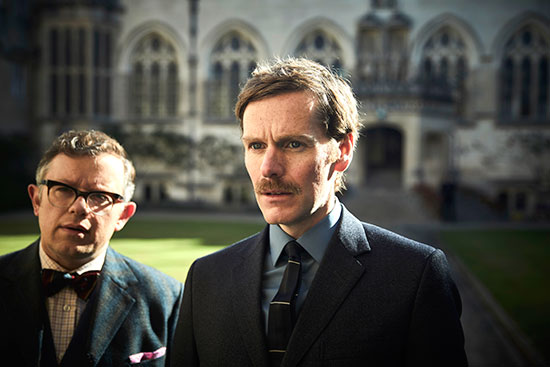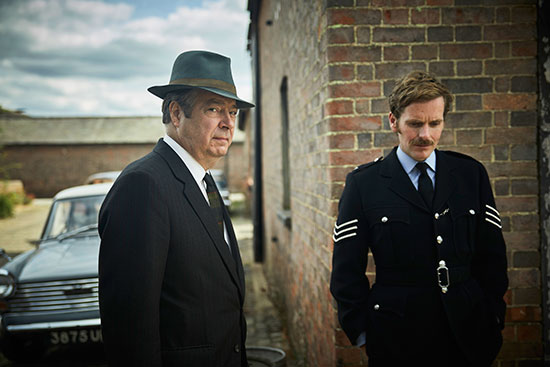Last Updated on January 9, 2020
Season 6 of “Endeavour” – the popular prequel to the beloved “Inspector Morse” series – premieres on PBS Masterpiece Mystery! in June 2019. Below, we outline the season, and then hear ‘Endeavour’ creator Russell Lewis’ thoughts about the sixth season.

To help keep this site running: Willow and Thatch may receive a commission when you click on any of the links on our site and make a purchase after doing so.
Shaun Evans sports a new look as DS Endeavour Morse in season 6, which follows Morse in 1969. Evans remarked “With a character you’ve played for a long time, it’s nice to have a change. As we’re now about to enter a new decade, it also marks the transition towards the 1970s. He’s moving with the times.”
His character will also be facing new challenges, with Morse having started a new role as a uniformed officer at the Woodstock police department. Evans said his character is “on his own out in the sticks. Following the dissolution of Oxford City Police, he’s been stationed in a one-horse town in the countryside. He’s fairly isolated as he’s the only policeman there.”
The latest installment of the British period drama picks up with the team as they find their feet in their various new roles. Fred Thursday (Roger Allam) has a new position at the forbidding Castle Gate station, joining former adversary DCI Ronnie Box (played Simon Harrison) and his new sidekick DS Alan Jago (played by Richard Riddell).
Allam shared that “Fred is in a very bad way because of the demotion and the death of George Fancy. The end of the last series also saw his brother take all his money meaning he couldn’t retire, so relations are very bad with Win (Caroline O’Neill). He’s not in a good way at all.”
Meanwhile, Strange (James Grout) has taken a management role with Division and Bright (Anton Lesser) has been relegated to the Traffic department. Joan (Sara Vickers), Inspector Thursday’s daughter, has also settled back in Oxford and is training to work in social services under the guidance of new manager Viv Wall (played by Alison Newman).
The ‘Summer of Love’ is well and truly over, and 1969 promises to be darker and more challenging than ever. However, despite their separation, the tragic murder of DC George Fancy still hangs over them, with the case remaining unresolved.
Evans put his directorial mark on the show, heading behind the camera for the second 90-minute episode of the series. He “loved doing it – it was an incredible experience.”
The sixth installment of the popular period drama filmed in and around Oxford, has once again be written by “Endeavour” creator Russell Lewis who has penned each of the 27 screenplays.
Read on for “Endeavour” writer and creator Russell Lewis’ reflections on the sixth season.
4 episodes, Rated TV-14
Seasons 1 -6 are AVAILABLE to STREAM

1969. The end of the 60s, and, for Oxford’s Finest, the old order changeth….
All is broken. The fellowship of Cowley nick lies sundered; scattered to the four winds. Eight months on, and the death of George Fancy – whose murder lies yet unsolved and unavenged – weighs heavily on the conscience of his friends and colleagues.
As the decade draws to a close, the bonds of friendship that existed between our quartet of former City men hang by a thread. The smell of fresh paint at Castle Gate – Thames Valley’s new police station – is soured with the scent of mistrust, and betrayal hangs heavy in the air. Whether old allegiances can survive this brave new world remains to be seen…
“Endeavour” – as a series – has always been about Morse’s journey from innocence to experience. Our mission – such as it is – has been to try to fill in some of the unwritten history that pointed the way to the man he would become.
When we first met Endeavour in 1965, he was a young man with a certain hopeful naiveté about him. Nobody’s fool, but a little gauche. The optimism of youth still burned brightly upon his brow. His heart – that faithful, haunted heart – was worn upon his sleeve for all to see. But a lot of blood has flowed under Magdalen bridge since those green days, and the heartaches and thousand natural shocks have cost him dear.
Thus, we find him – in high summer 1969 — once shy, twice bitten. Rootless, adrift, and with no place to call his own. Scarred by recent experience, he has retreated – withdrawn from the world, and allowed his former friendships and associations to fall into neglectful disrepair. His waking hours are lost in the anaesthetic of the humdrum, his nights in another kind of anaesthetic altogether. Now, we would call it ‘self-medicating’ – a need to numb the senses, and still an overactive mind. We build our defences against a wounding world brick by brick – but a fortress may well become a prison; as to close oneself off from the possibility of pain also denies a potential for happiness.
We’ve put Endeavour through a lot across the past five series – physically, psychologically, emotionally, and romantically. But however hard life has come at him, he’s always had the solid support of Fred Thursday to rely upon; confidence to share and troubles to halve over a pint or two – or a late night on the whisky.
Now – the game has changed – and that prop has been removed. For if Endeavour is no longer the man he was, then Thursday also has fallen prey to self-doubt, guilt and regret. Dispossessed of authority at work, and with his home life in ruins, all Thursday once held dear now stands upon the balance.
Chief Superintendent Reginald Bright is also a shadow of his former self. Side-lined, marginalised, he has become something of a figure of ridicule. A change in fortune that’s hard to take for a man of quiet dignity and pride. The old certainties upon which he could depend — order, discipline, a respect for authority, the chain of command, a benevolent paternalism – once fixed and immutable, appear now discredited; easy targets for the cheap mockery of a younger generation. The world has moved on from that he knew as a young officer with the Colonial police, and it seems has left him behind.
Of them all, only Detective Sergeant Jim Strange seems braced and ready to meet the coming decade. A political animal by instinct, Strange has always had an eye for the main chance – and yet, even he remains uneasy – unwilling to bury the memory of George Fancy along with the passing decade.
With the surviving quartet of City men each isolated one from the other, it falls to friends and colleagues to provide constancy and continuity. Dr Max deBryn – “the one true friend”- in his own quiet, and unassuming way, is set to become custodian of the group’s conscience – keeping the tattered Colours safe until such time as they may be needed once again.
Though the Britain slouching towards 1970 is a place vastly changed from that which began the decade, Dorothea Frazil – detective without a badge, and the beating heart of the Oxford Mail – remains as true as the Pole star, and Endeavour’s staunchest ally in the pursuit of truth and justice.
However – if colleagues remain constant, change is in air for Win Thursday. Hitherto, the “good wife” – loyal and dependable – her patience has been tested to breaking point, and things Chez Thursday may never quite recover.
Joan, too, is on a journey of her own. The dutiful daughter and bank teller of ‘65 has yielded place to a young woman with a social conscience, and a burning desire to put the world to rights. Whether room in her life remains for romance, and for one admirer in particular, remains to be seen.
All of us involved in making Endeavour have always wanted to keep the show fresh, moving forward, and pushing the boundaries of what a notionally cosy whodunit might encompass.
We are in a slightly different place to Inspector Morse, and, indeed, Lewis, insofar as Endeavour has a timeline – a sense of development for our characters as we move towards a pre-ordained terminus – a remorseful day of our own, which is, alas, inching slowly into view.
But we have a way to go yet, and 1969 delivers four new cases to test Endeavour, Thursday, and Oxford’s finest.
Namely “Pylon,” “Apollo,” “Confection,” and “Degüello.”
Each story in its way reflects changes in Britain and the wider world. However, when it comes to crime, some things never change. Getting to add another quartet of tales to the history of Colin Dexter’s immortal creation remains the most tremendous pleasure and privilege.
Looking back across 1969, we’ve certainly taken “Endeavour” into some new places.
Episode 1: “Pylon” sets the tone and rings the changes loud and clear. For all the pastoral idyll of blue skies and cornfields, there is a darkness on the edge of frame – a sour note of corruption, moral and mortal – that threatens to overwhelm all. The tra-la days are over.
Episode 2: Mister Evans step up to the plate and direct “Apollo.” It should come as no surprise to hear that he took to it like a duck to l’orange, and made it a very happy experience for all involved. It’s funny how things work out. Of all the stories that he might have done, the fates conspired to literally give him the moon. Quite right, too. One small step for a man…
Episode 3: “Confection” examines the rose-tinted, sugar-coated deception of nostalgia. Whether it’s brands of sweets that one recalls from childhood, or the notion of some prelapsarian England where the buses run on time, and there is honey still for tea, to borrow from Paddy McAloon, ‘nothing sounds as good as “I remember that.”’
Episode 4: “Degüello” draws together the central themes of 1969 and brings proceedings to a close. We end, then, on the brink of the Black Forest, chicken in a basket, 1970s. Decimalisation and a certain date with the mother of King Minos just around the corner. How much of that story we will see through the eyes of Oxford’s finest is an open question – for, as ‘The Quiet One’ was shortly to observe, ‘All things must pass.’ – Russell Lewis
Sundays, June 16 – July 7, 2019, 9:00-10:30 p.m. ET
4 episodes, Rated TV-14
Seasons 1 -5 are AVAILABLE to STREAM
The hit detective drama “Endeavour” has been recommissioned for a seventh series. Produced by leading indie Mammoth Screen in partnership with PBS Masterpiece, the new series will be set in 1970 and production will begin later this year for transmission in 2020.
![]()
If you enjoyed this post, you’ll want to wander over to the Period Films List– the best costume dramas, heritage films, documentaries, period dramas, romances, historical reality series and period inspired movies, sorted by era and theme. You may also like the news about Pennyworth, starring Jack Bannon, who plays Inspector Thursday’s son on “Endeavour.”


Charlotte Thurschwell
July 1, 2019 at 11:22 pm (5 years ago)Love the british shows-especially morse/endeavour.
Elaine
June 6, 2019 at 7:46 pm (5 years ago)Can’t wait to start the new Series.
Barbara Stracner
June 6, 2019 at 2:00 pm (5 years ago)Thank you from a long-time Morse/Endeavour fan!